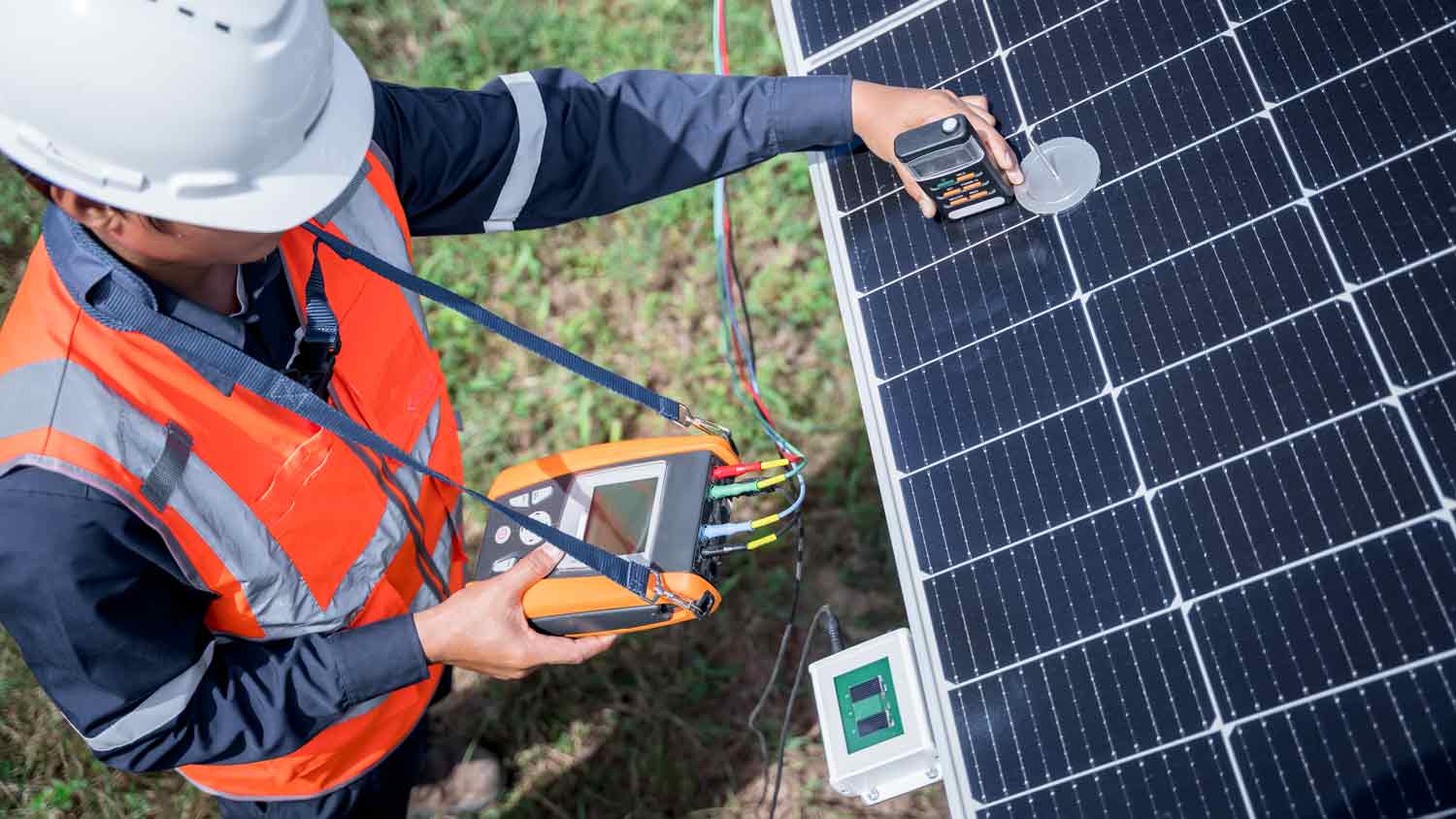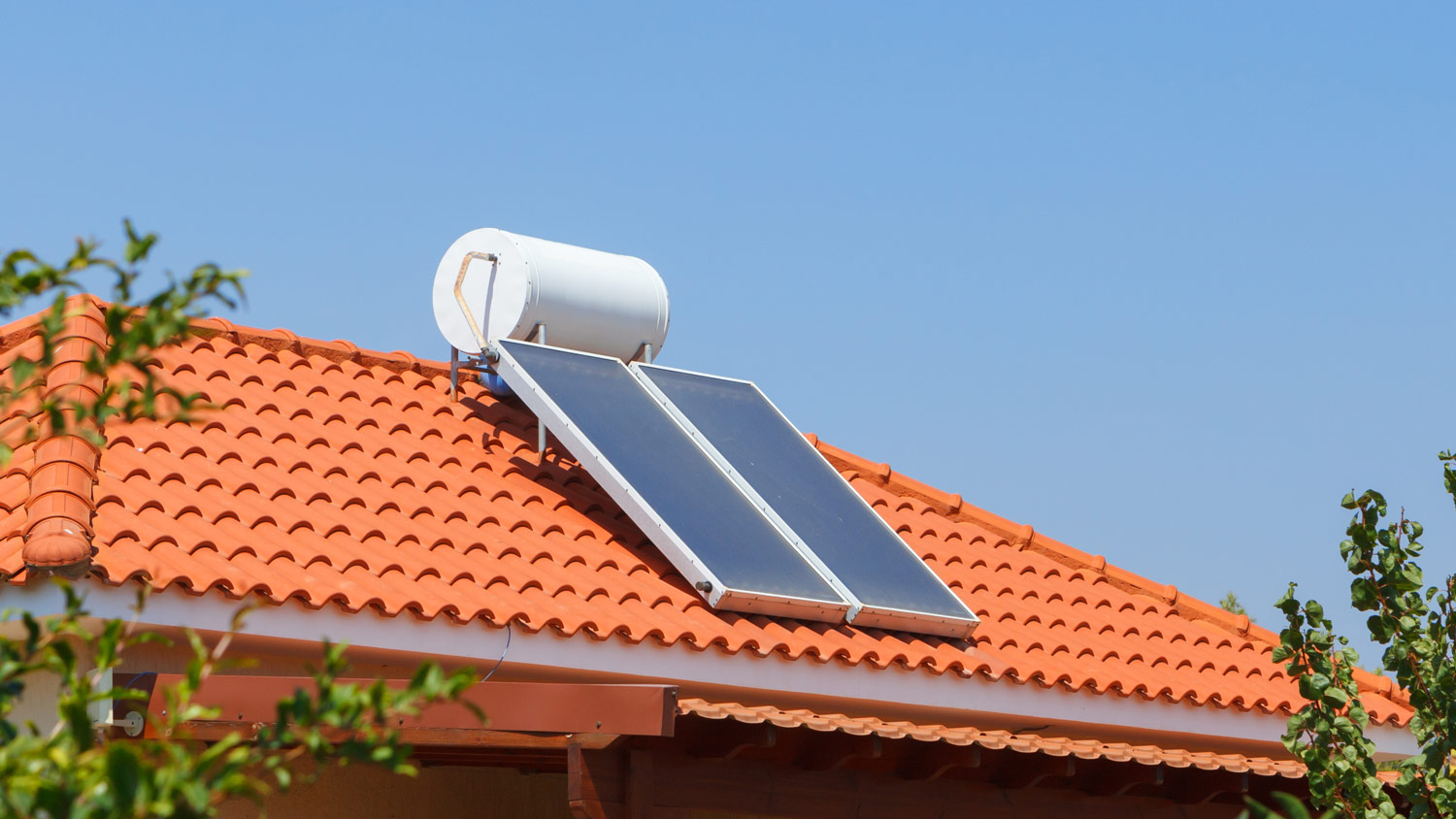
Discover the average solar panel inspection cost, what impacts pricing, and how to save. Get expert tips to keep your solar system efficient and safe.
Solar is clean, green, and more complicated than it may seem


Solar energy is renewable, helps with energy independence, and lowers energy bills.
Pros include a smaller carbon footprint, higher home value, and tax credits.
Cons include high up-front costs, inconsistent energy production, and bulky panels.
Before switching, consider your roof, location, climate, and energy use.
Does the thought of switching to solar energy make you shine brightly or leave you in the shade? The solar industry is booming, and more homeowners than ever are installing solar panels. But it’s not all sunshine and savings—there’s a lot to consider before you decide whether to harness the sun for your home. This guide discusses all you need to know about the pros and cons of solar energy systems.
You’ve certainly heard the term, but you may still be wondering, what is solar energy? Solar energy harnesses light and heat from the sun to create electricity for homes and businesses. This renewable energy source is a cleaner alternative to fossil fuels, allows for more energy independence, and lowers energy bills.
| Pros | Cons |
|---|---|
| Reduces utility bills | High up-front costs |
| Lowers carbon footprint | Energy production depends on the weather |
| Increases home value | Requires space |
| Offers energy independence | Doesn’t fit on all roofs |
| Systems are low-maintenance | Energy storage can be expensive |
| Incentives and tax credits lower costs | Inconsistent energy production |

It’s easy to see why solar energy is gaining popularity. Using the sun to create electricity cuts energy costs, makes homes more appealing to buyers, and shrinks your carbon footprint. Here are more reasons to bask in the power of solar:
Solar panels generate electricity from sunlight to power homes and other buildings. This reduces utility costs, and some homeowners sell excess energy back to the grid. A solar panel installation company near you can estimate how much you can save.
By swapping traditional power sources for solar, you’ll significantly reduce your dependence on fossil fuels, lowering your household’s greenhouse gas emissions and environmental impact.
Homes with solar systems often sell faster and at higher prices than comparable homes without solar. According to the U.S. Department of Energy, solar panels can increase home value by about $15,000.
Solar panels let homeowners depend less on the power grid. This can be beneficial in areas prone to power outages, rolling blackouts, and high energy costs. You can also learn how to increase solar power efficiency for even greater results.
Once they’re installed, solar panels require minimal maintenance. Most solar panel systems last 25 to 30 years with regular cleaning and inspections. You can clean solar panels yourself, or hire a local solar panel cleaning company.
Federal and local tax credits, rebates, and other incentives can offset the cost of installing solar panels. For example, the federal solar tax credit gives up to 30% of your total solar installation cost. This will reduce the overall cost so your system pays for itself sooner.

At its best, solar power can be a great investment. However, you’ll need to research whether solar panels are worth the investment or just sunburn for your wallet.
The average solar panel installation costs $27,200, with costs ranging between $18,400 and $36,400. Up-front costs include solar panels, inverters, batteries, and installation. Electricity savings and incentives can mitigate these costs, but they can be prohibitive.
Solar panels are most effective in places with a lot of sunlight, minimal cloud cover, light breezes to keep panels cool, low humidity, and temperatures around 77 degrees Fahrenheit. They’ll generate less energy on cloudy or rainy days and in areas with frequent overcast conditions or long winters. If you live in a climate with cold weather, consider how solar panels work in the winter.
High-performing solar arrays aren’t small, and you’ll need sufficient roof space for installation. Small roofs may not have enough space for enough panels to meet household energy needs.
Not all roofs can hold solar panels. Roofs with delicate materials (like slate or clay tiles), sharp slopes or pitches, and areas shaded by trees or buildings may not be good fits. South-facing roofs are best because they get more sunlight than homes facing other directions. Bonus points—and more energy—if your roof has a slope between 15 and 40 degrees.
Producing solar energy is one thing—storing it is another. Solar panels produce energy during the day, but homes tend to use more electricity during the evening and night. While battery systems can store excess energy, they add significant costs to solar setups.
Solar panels need direct sunlight to be most effective, and they don’t generate electricity at night. You can use solar panels directly without batteries, but you’ll need to rely on the power grid or an alternative power source for energy after sunset.
Now that you know the pros and cons of solar energy, learn about these alternative energy sources as you consider your options.
Wind turbines convert kinetic energy from wind into electricity. Homeowners can install small, residential-sized wind turbines as long as zoning laws and space allow.
Geothermal energy systems use the earth’s heat to generate electricity or provide heating and cooling for homes. These systems are particularly effective in areas with geothermal activity and can be costly to install, but they pay for themselves by lowering utility bills.
If you live near flowing water, look into micro-hydropower systems that convert water’s kinetic energy into electricity. This option is site-specific and requires a reliable water source that flows at a certain rate.
As organic materials like wood, crop waste, and animal waste degrade, they generate heat that can be turned into electricity through biomass power generation. This can be a sustainable option, particularly for rural homes, because it needs a consistent source of biomass fuel.
If you’re looking for a hybrid approach, stay connected to the power utility and purchase renewable energy credits. This gives you reliable power using renewable energy like wind or hydro, so you can feel better about your energy use and have power every time you flip a switch.
While renewable energy may be the future, solar isn’t right for every home right now. Consider these factors:
Roof suitability
Location and climate
Energy needs
Overall cost
How long you plan to live in your home
Every situation is unique, so talk with a solar installer or energy consultant to help determine whether solar energy is right for your home and needs.
From average costs to expert advice, get all the answers you need to get your job done.

Discover the average solar panel inspection cost, what impacts pricing, and how to save. Get expert tips to keep your solar system efficient and safe.

Get a clear estimate for solar water heater repair cost. Learn what impacts pricing and how to budget for your solar water heater repair.

There are a few factors to consider when it comes to solar panel repair costs. This guide breaks down the prices of solar panel removal, repair, and replacement.

Looking at solar panels for your home? You’ll need to choose between monocrystalline versus polycrystalline solar panels. Here are the pros and cons of each.

Whether you're going solar or your panels are getting older, you might be wondering if solar panels are recyclable. This guide covers what you need to know.

Let’s dig into the debate between solar batteries versus generators to help you choose the best backup power solution.